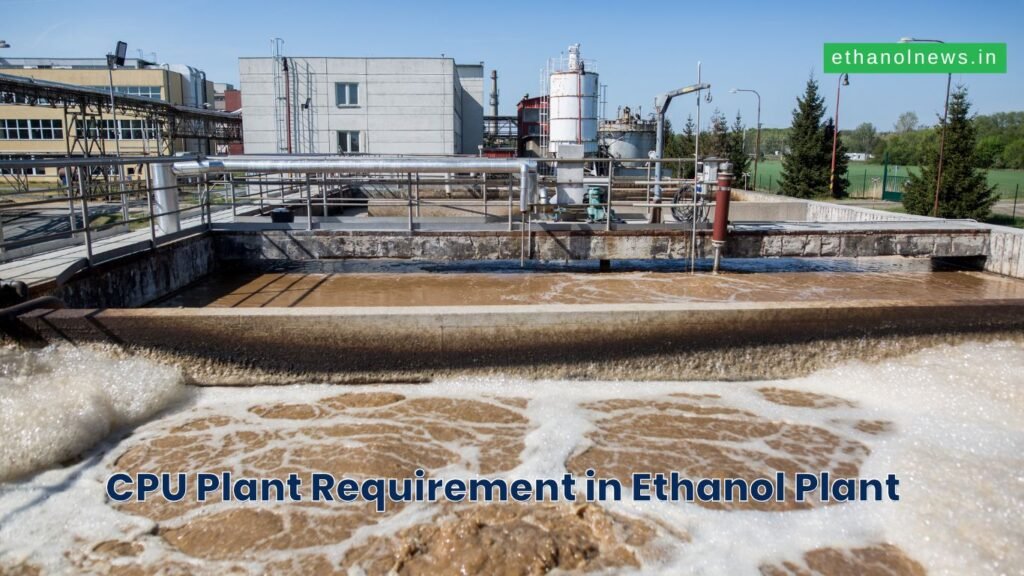Introduction to CPU Plant in Distillery Ethanol Production
Why CPU Plant is Essential in Ethanol Plants
Table of Contents

1. Water Recovery and Reuse
Distillery plants consume a large quantity of water in fermentation, distillation, and cooling processes. A CPU plant effectively treats process condensate and enables water reuse, which significantly reduces freshwater dependency.
2. Compliance with Environmental Norms
The ethanol industry must adhere to stringent environmental regulations. A CPU system ensures that the effluent meets permissible discharge standards, minimizing pollution and supporting sustainable operations.
3. Reduction in Effluent Load
By removing organic and inorganic impurities from the process condensate, a CPU plant reduces the load on the Effluent Treatment Plant (ETP), leading to lower operational costs and enhanced efficiency.
4. Improved Distillery Efficiency
A well-designed CPU system improves the overall efficiency of the distillery by recycling high-quality water for various plant processes. This ensures consistent steam generation, reduced scaling, and better boiler efficiency.
Key Specifications of a CPU Plant for Distillery Ethanol Plants
1. Capacity and Flow Rate
The CPU plant should be designed based on the process condensate load. Typical capacities range from 50 KLPD to 500 KLPD, depending on the plant’s production scale.
2. Treatment Technologies Used
A standard CPU system consists of multiple stages of treatment, including:
- Filtration Units (Pressure Sand Filter, Activated Carbon Filter) – Removes suspended solids and organic contaminants.
- Ultrafiltration (UF) or Reverse Osmosis (RO) Systems – Ensures deep purification by eliminating finer particulates and dissolved salts.
- Membrane Bioreactors (MBR) – Helps in breaking down organic matter biologically.
- Ion Exchange Resins – Used for demineralization and deionization of water.
- Advanced Oxidation Processes (AOPs) – Removes trace organic pollutants and improves overall water quality.
3. Automation and Control
A modern CPU plant is equipped with PLC-SCADA-based automation to enable real-time monitoring, process control, and data analysis. Automation ensures optimal operation, reduced manual intervention, and enhanced performance.
4. Energy Efficiency
Efficient CPU plants are designed with low energy-consuming pumps, optimized membrane technology, and heat integration techniques to minimize power consumption.
5. Maintenance and Durability
A well-structured CPU system should have corrosion-resistant materials, easy-to-maintain components, and a modular design for seamless operation and minimal downtime.
Benefits of Installing a CPU Plant in a Distillery Ethanol Plant
1. Significant Cost Savings
By recycling process water, distilleries can cut down on water procurement costs, reduce effluent treatment expenses, and lower boiler feedwater treatment costs.
2. Enhanced Process Efficiency
Using treated condensate water in boilers and cooling towers improves heat transfer efficiency, leading to better fuel utilization and reduced maintenance.
3. Reduced Carbon Footprint
Lower freshwater consumption and optimized waste management contribute to reducing the overall carbon footprint of the ethanol plant.
4. Improved Product Quality
Contaminant-free recycled water ensures consistent fermentation and distillation efficiency, improving the final ethanol quality.
5. Long-Term Sustainability
A CPU plant promotes sustainable industrial practices by reducing water wastage, pollution levels, and environmental degradation.
How to Choose the Right CPU Plant for Your Ethanol Distillery?
1. Assess Water Quality and Quantity
A thorough analysis of process condensate composition is essential for selecting the right CPU plant technology.
2. Consider Energy Consumption
Choosing energy-efficient systems with advanced membrane technologies helps in reducing operational expenses.
3. Ensure Regulatory Compliance
The CPU plant should meet CPCB, SPCB, and ZLD (Zero Liquid Discharge) norms to avoid legal and environmental liabilities.
4. Opt for a Reliable Manufacturer
Investing in trusted CPU plant manufacturers with a proven track record ensures high-performance, durable, and low-maintenance solutions.
5. Plan for Scalability
A modular design enables easy upgradation and expansion as per future requirements.
Conclusion
The CPU plant is an indispensable component of a distillery ethanol plant, ensuring water conservation, cost reduction, and operational efficiency. With the increasing focus on sustainability and regulatory compliance, installing a high-quality CPU system is a strategic investment for ethanol production properties.
For the latest ethanol industry updates, visit: ethanolnews.in
Read More:




